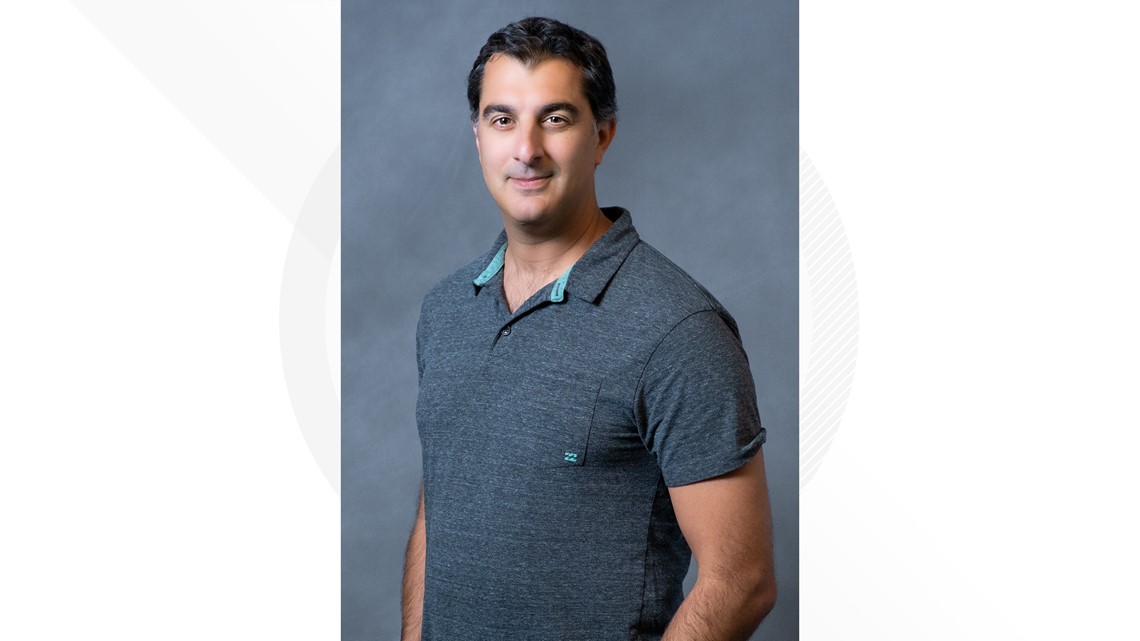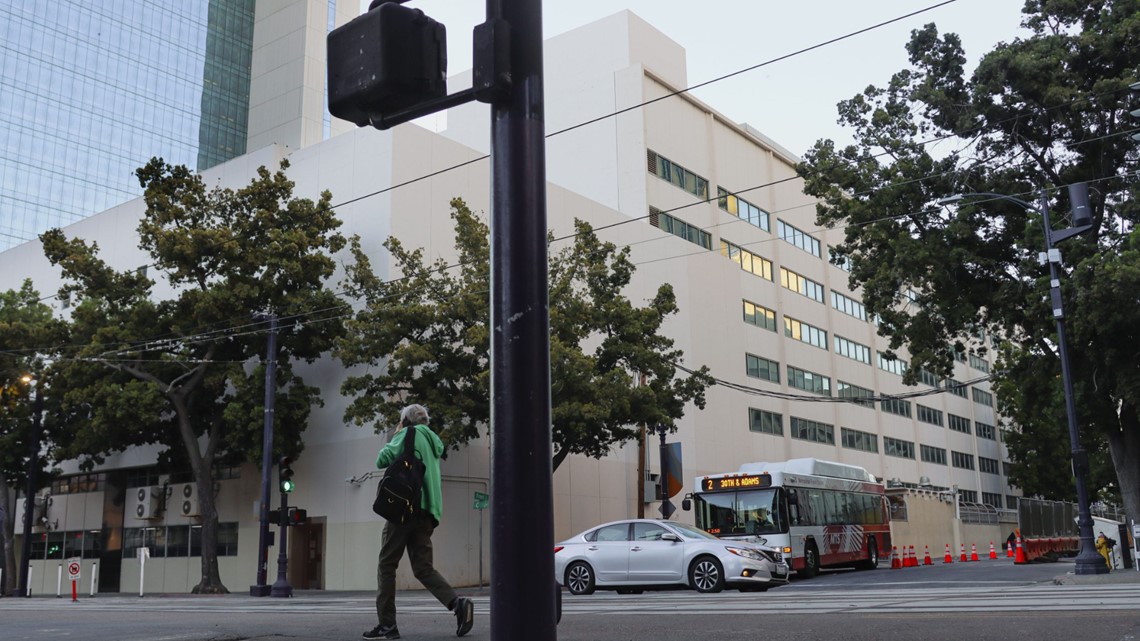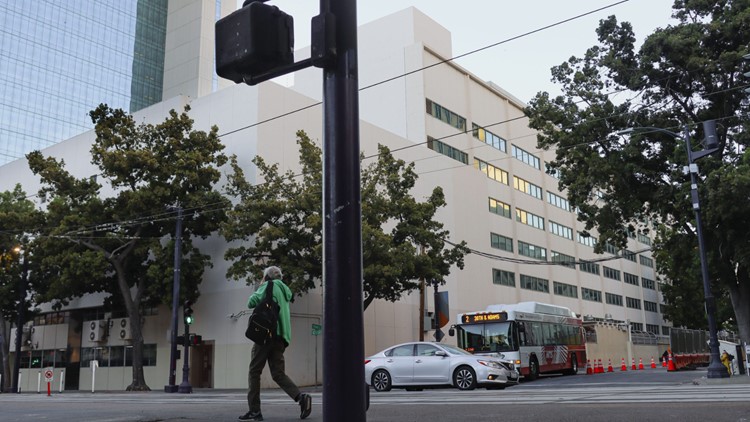SAN DIEGO — We are six weeks away from a deadline that will redefine the future of a controversial San Diego federal jail. But what exactly will happen when the deadline passes remains a mystery to the public.
Here are the basics: Western Region Detention Facility mostly houses nonviolent federal offenders for the U.S. Marshals Service who are waiting for their court cases to be heard.
It’s operated by a massive private prison company called The GEO Group, Inc. You might recognize the company’s name from political debates over private prisons that have taken place in California and across the U.S. over the past few years.
Last year, the debates culminated in President Joe Biden’s executive order, which is supposed to phase out federal prison contracts with for-profit companies like GEO Group. The president’s order pointed out that private prisons are less safe and offer lower quality services than public prisons.
So when GEO Group’s contract to operate Western Region expires in March, the detention center should, in theory, shut down. But behind the scenes, negotiations are underway to try to keep the facility open.
The details might seem complicated, but we’re here to break them down for you. This is what you need to know.
- A private prison company is trying to use an unconventional workaround to keep the jail open.
In August, GEO Group started working with McFarland, a small city in the Central Valley, to help keep control of the San Diego prison.
Under the arrangement, McFarland would take over the federal contract for Western Region, then subcontract the prison operations to GEO Group.
Basically, the financially strapped city would serve as a middleman — and make a $500,000 administrative fee in the process.
The San Diego ACLU has called the negotiations a “shell game” that would “set a dangerous precedent to allow prison corporations to recruit far-flung municipalities to help them defy White House criminal justice policy.”
It’s not yet known if McFarland is going to follow through on the deal. The city would not answer questions about the Western Region contract.
- The ACLU is suing the government for information on the future of Western Region.
The ACLU sent public records requests to the Marshals Service in October and January, asking for contracts, emails and other documents that would explain whether Western Region is going to shut down or stay open at the end of March.
Under federal law, the government must respond to these requests in 20 to 30 business days. The ACLU never received responses to either request, according to its complaint.


“This place has 770 beds, and it’s in downtown San Diego,” said Bardis Vakili, senior staff attorney for the San Diego chapter of the ACLU.
“It incarcerates people in the San Diego community. It impacts us deeply. And yet there’s been no public information about what’s been happening,” he said.
inewsource spent two weeks trying to track down answers from GEO Group, the Marshals Service, lawmakers, attorneys and unions, but nobody would explain what is going to happen to the federal jail.
- Western Region has been accused of unsafe and inhumane living conditions.
Court filings show GEO Group is facing many allegations of creating dangerous living conditions at the San Diego detention center, especially during the pandemic. These concerns have been cited as one of many reasons the jail should shut down.
Detainees have repeatedly complained about a lack of social distancing or medical care for those who contract COVID-19. At one point during the pandemic, the concerns prompted a hunger strike with 100 participants.
At least 250 people incarcerated at Western Region have contracted the virus since the start of the pandemic, according to the Marshals Service.
In its lawsuit, the ACLU said GEO Group “systematically delays and deprives incarcerated individuals of medical care.”
The complaint cites the case of a 53-year-old woman with multiple sclerosis and anxiety who was denied her medications, causing her to suffer from seizures.
GEO Group is also facing a class action lawsuit from inmates with disabilities who say they've suffered serious falls and injuries because of unsafe showers.
- New records show an inmate died from COVID-19 at the jail before he could plead not guilty.
Lorenzo Laumbach was arrested in September for smuggling methamphetamine across the U.S.-Mexico border. Within three weeks, he was diagnosed with COVID-19 and transported to the hospital because of breathing issues.
Laumbach continued to decline in health until he died on Sept. 23. He was never able to make it to his arraignment, where he could have pleaded not guilty to his charges.


Public defenders in San Diego have asked the courts to release more pre-trial defendants from jail during the pandemic, particularly nonviolent offenders who don’t pose a risk to the community and have not been convicted of a crime. But those attorneys haven’t had much success.
Based on the terms of his bond, Laumbach would have been released from custody if a relative with $15,000 in assets paid the court $1,500 in cash.
Vakili, the ACLU attorney, said Laumbach’s bond was fairly low, but he may not have had the financial means to pay it.
“It’s just the definition of a senseless death,” Vakili said. “There is no reason that people charged with nonviolent crimes should be locked up solely because they’re poor.”
- Activists, lawmakers and unions disagree over whether Western Region should shut down.
A union representing Western Region staff has been pushing the government to keep the facility open, and some lawmakers have come out to support the union’s cause.
“We respectfully ask that you stand with these hard-working Americans and save these 300 good union jobs,” wrote the National Federation for Federal Employees in a letter to Biden in August.
Rep. Scott Peters, whose district includes Western Region, told the president in September that shutting down the facility could create problems for defendants who would have to relocate to other parts of the state — far away from their families or defense lawyers.
But some community organizations, along with the ACLU, say those reasons don’t justify allowing for-profit companies to make money off of incarcerated people.
“You’re talking about Black and brown and poor white community members,” said Khalid Alexander, president of Pillars of the Community in San Diego.
GEO Group operates 86,000 beds at 107 facilities across the United States, Australia, South Africa and the United Kingdom. In the first nine months of 2021, the company made $127 million in profit.


